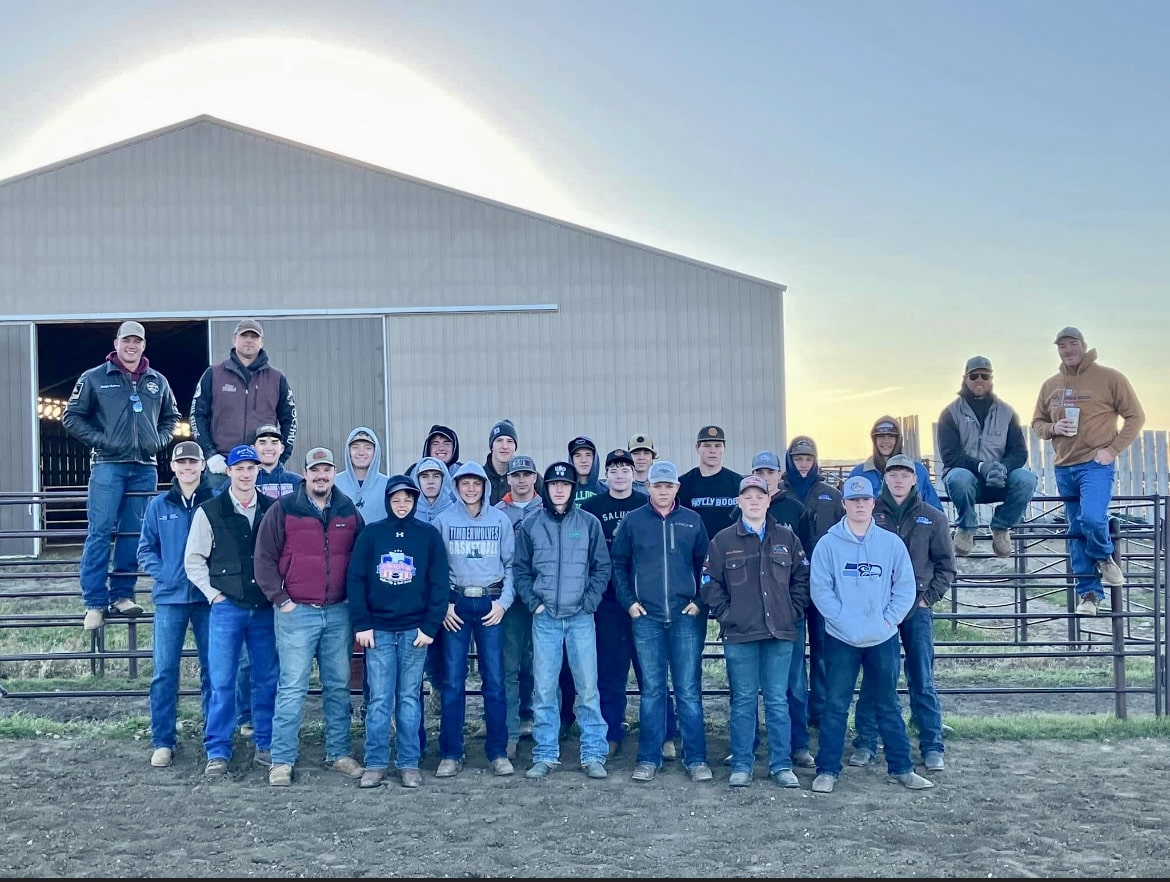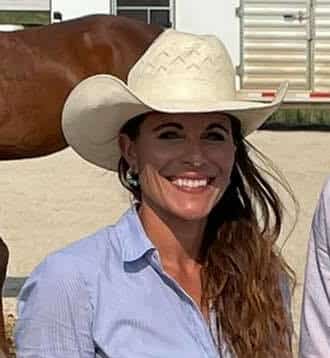ADS

On an October fall weekend in the little town of Almont, North Dakota, there was a lineup of National Finals Steer Wrestlers, including a World Champion. Jacob Edler, Bridger Anderson, Cameron Morman, and Tyler Schau came together to exhibit their bulldogging skills and provide insights into rodeo for the next generation. Tyler and Jackie Schau of Diamond S Performance Horses hosted the event. The event’s sponsors, such as BOB Enterprises, AH Inc, and Diamond S Performance Horses, have strong ties to steer wrestling and fully encourage an upcoming crew of bulldoggers.
Wrestling an animal that is 4 to 5 times your weight, jumping off a horse at full speed, reading a barrier, and reading an animal that doesn’t speak English is one hundred percent a cowboy event, through and through. Some may say, it’s the big man’s event. These instructors, however, say it’s the event where you get knocked down – time and time again, and keep trying.

Tyler Schau on the dummy instructing with Jacob Edler [Photo: Tisa Peek]
What the greats have to say –
“We’ve tried to do a bulldogging school every year for the past ten years,” said Tyler Schau. Last year, the weather stopped it, but this year, the Schaus had some heavy hitters from the rodeo arena gathered in Morton County for the clinic. The duo also hosts weekly practices throughout the year.
“We have learned a lot of life skills and practices just from steer wrestling,” added Schau referring to fellow North Dakotan steer wrestlers Scott Kleemann, Anton Helfrich, and himself.
Tyler Schau in action [Photo: Annika Plummer Photography]
Schau said that a lot of people think steer wrestling is just grabbing a horn and tackling the steer. “There is a lot of technique that goes into it. We have a couple machines that we use to teach kids the correct techniques. There is a lot of body positioning and getting your body in the right position to take advantage of what the steer gives you. There are some experienced kids here, and some that have never bulldogged before,” added Schau.
“Steer wrestlers are a group of guys that always root for each other; everyone is there to help everyone out. We try and teach these kids how to root for each other by developing the skills to get off your horse and chip in and move steers throughout the alley, or whatever else needs done,” said Schau.
Schau explained that you don’t have to be big or super athletic to be a steer wrestler, rather be able to nod your head, again and again. In fact, Schau gives credit to the sport he believes helped him with the career he has today. It takes a lot of perseverance, calls, and contacts to be successful as a commodity broker. He says using his mental mindset from the rodeo arena helps in everyday business.

Bridger Anderson at Pendleton Roundup [Photo: Sam-Sin Photography]
It requires a lot of hands to have success in this sport –
Bridger Anderson was born and raised in Carrington, N.D. Making his second National Finals Rodeo (NFR) appearance this December, this rodeo athlete had some words of wisdom about steer wrestling and rodeoing for a living.
“We told those boys before we started this clinic, even if it’s not going really well for you or you’re not understanding, just keep trying. As long as you’re trying and giving your all. Even if you get mucked out by a steer, as long as you’re trying, we will keep helping. It’s really like that with bulldoggers across the country. The kids that keep trying, they are going to make,” explained Anderson.
The rodeo trail can be tough at times discussed Anderson, “We made the finals (NFR) this year, but there was a stretch for seven weeks that I didn’t win a check. That’s a lot of losing when you’re going to 5 to 10 rodeos a week. You just have to keep sticking to your goals, and what you set out to do, and keep trying.”

Bridger Anderson helping with form using a ‘steer saver’ [Photo: Tisa Peek]
Flipping the good steers in three seconds doesn’t happen by chance for Anderson. The cowboy grew up wrestling and developed discipline through not-so-comfortable practices, sweat, and demanding meets that not only took him to state titles on the wrestling mat, but also helped his rodeo career both mentally and physically.
“It’s the life lessons I learned from wrestling that helps. Life lessons on how to persevere and how to find the bottom of your tank and keep going. It’s crazy how much I learned from it – the body control too. Being able to react to some steers that don’t go your way and hustle through it,” said Anderson. “I learned lots of things from wrestling, and it helped train me mentally for going down the road, and the discipline it takes to give it your all when you have nothing left.”
As far as the future goals, Anderson says he is going to try and keep making the finals every year as many times as he can. “It’s what I’ve wanted to do, since I was 3 years old. It was always the goal to rodeo for a living, so everything I did was centered around preparing myself to go rodeoing. I didn’t come from a professional rodeo family, and I didn’t know exactly what it took to make the finals. We rodeoed as a family, and I’m grateful it worked out,” added Anderson.
Anderson said that the one thing that’s important is to know it’s going to happen and to manifest it and to have confidence. Anderson said he also believes it’s important for up-and-comers to know they must practice knowing it’s going to happen, especially when it comes to flipping an animal four times your size. “We can go along and say, ‘You’re going to flip that steer,’ but do you know it?” added Anderson.
All these instructors agreed that it takes an army of support to go down the road rodeoing professionally.
Anderson said, “I could start with my family and my parents that set me up for success and gave me opportunities to go chase my dreams. The friends and everyone that have helped me practice, including the Schaus and Kvammes (of Carrington). It goes a long ways. It’s crazy how many hands have gone into having success in this sport – the mentors, and going to college, and people picking you up on the side of the road, and your sponsors helping you. If I was to make a list, it would probably be a hundred pages long of just the names of people that have helped me out. It’s amazing that we live in a world, especially this rodeo community, where people are very helpful for you,” smiled Anderson.

Jacob Edler, World Champion [Photo: Ric Anderson]
Small details make big champions –
World Champion Steer Wrestler Jacob Edler said, “I grew up in Iowa, and Tyler was my neighbor. And he is the reason I’m a bulldogger. I always like coming up here to North Dakota. The kids seem to have a lot of grit, a lot of heart, and try.”
“I was just instantly hooked right away to bulldogging. The rush of jumping off a horse onto a steer; I absolutely loved it for some reason. Once I got to know the people involved and the western way of life, that made it all the better. You will not find better people in all the world than rodeo or any type of western sports industry,” added Edler.
Edler said that bull doggers build comradery by sharing each other’s horses, hazing for each other, and either pushing steers or holding their heads. “This is an awesome sport to be a part of,” said Edler.
As far as the horses Edler and other champions use in the arena, he noted that steer wrestling is something you do not force horses to do, because they love it just as much as the competitors do.
“My main job right now is a professional steer wrestler, that’s what I claim to do. There are hours and hours of preparation. I go to the gym every day. I have young horses I ride every day that are up-and-coming hopefuls, and we train every day. I exercise and care for my competition horses every day. We practice every day. To be a champion, it’s the small details. It’s the things that other people don’t think about. Once you put the screws to those fine details, it’s pretty amazing what can happen. Small details make big champions,”added Edler.

Cameron Morman in Action [Photo: Sam-Sin Photography]
Slowing down and being correct makes wins happen –
Right after adding a new, little boy to his family, Cameron Morman hit the road this summer and enjoyed some big wins, like the Pendleton Roundup and the Badlands Circuit Steer Wrestling Champion this fall. And as sure as the wind blowing in a North Dakota blizzard, the Glen Ullin bulldogger is no stranger to wrestling steers at the NFR.
Explaining how rodeo can have its highs and lows, Morman said, “There are three animals and two humans we are dealing with to make a run line-up to be under four seconds and sometimes three seconds.”
A lot more goes into mastering those runs than the naked eye can see.
“What kids don’t realize is that at the professional level we are all trying to work on control and the little techniques, such as getting out on the barrier and riding a horse well. It’s all the basics that we are working on a daily basis in order to win,” said Morman.
Cameron Morman [Photo: submitted]
The NFR cowboy emphasizes that to win, you have to slow down to do things technically correct.
Morman’s take on the relationship of bulldoggers in the professional arenas is simple, “You are competing against other people as far as money won, but you really can’t beat anyone unless you go do your job on every steer you draw. In the end, that defines whether you make it or not.”
Cameron Morman talking to the next generation. [Photo: Tisa Peek]
As far as rodeoing full-time, Morman explained, “I was fortunate when I started rodeoing hard, because I got in with guys that were down to earth.” Morman explained there are no secrets, and that it really boils down to, “You’re only going to win as much as you put into it.”
For more, watch Dakota Cowboy on BEK TV this winter for the full interviews.

Tisa Peek is a long-time horse trainer, competitor in barrel racing and team roping, and writer about the equine. Rodeo and horses run deep in her roots. JT Family Equine is where she calls home, south of Bismarck, ND. Tisa, along with her husband, Jon, and boys, Blu and River, train horses and host clinics. Tisa is the host for Dakota Cowboy on BEK TV.
